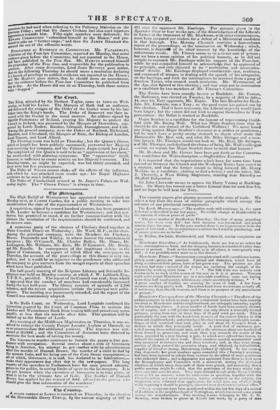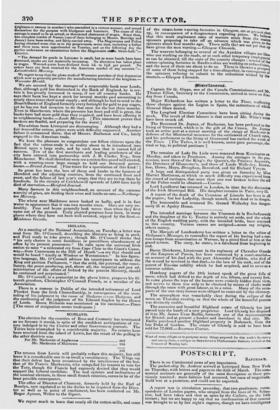The country papers give gloomy accounts of the state of
trade. We select a few from the mass of similar paragraphs which occupy the columns of our provincial contemporaries : The Leeds Mercury says—" The woollen trade still continues in the same dull state as described in our last paper. Ni, visible change at Huddersfield in time amount of sales or price-, of goods."
" The piece market of Bradford on Thursday, like that of many preceding week, bas heen very dull m but little business was transacted, and prices remain :dont the saute. In time yarn market there is no improvement train the repine of last week ; the minniacturers continue backward in purchasing, and of commie pi ices are no better."
At Halifax, Rochdale, Huddersfield, and Wakefield, similar complaints are made.
Manchester Guardian—. At Saililleworth, there are few or no orders for home consumption on hand, and the shipping business is considered rather dans Retinas at present. Trade in this branch, as in all others, is consequently very dull ; it was probably never more so in this district."
Manchester Times—" Business is at a complete stand- still--confid awe is com- pletely gone—prices are nominal. Fustian,' and domestics, which have all along maintained their prices, have at last given way. The printers are also in a very bad state ; several of the houses are imitating the example of the spinners by wolking short time. • • • The Silk trade was scarcely ever koown to be so slack at this season of the year as it is at present. Weavers
eight miles round Manchester are in a miserable condition, Milne not baying more than half employment, whilst many others are entirely without. • • • A great number of families are starving for want of food. A few fancy weave's are doing pretty well. Time cotton band-loom weavers are as badly off, if not worse, than the silk weavere, and there is no prospect of any amendment at present."
Manchester Correspoudence of the Morning chronicle—" The effects of the einharraomments in which so many great commercial houses have been recently involved in Matieliester and the neighbourhood, are unhappily extending rapidly to the labouring classes. A great number of hands have been entirely throwa out of employ, and a still greeter number can only obtain a miserably limited pittance, am ising from two or three days of ill-paid %volt per week. 'flail is particularly the case with the baud-loom weavers of the coarser fabrics in this town and neighbourhood; and yesterday (Nlonday) morning considerable assem- blages of that wretched class took place in and about Sr. George's Hoed, a district in which they principally reside. A good deal of excitment pre- vailed among those unfortunate men, and in the afternoon about one Impelled of them formed in procession, and made their way towards the centre of the town, preceded by a man bearing a pole, to which wire allixed two loaves, to indicate the nature of their want. heir numbers speedily accumulated until they amotnited to between two and three hundred ; anal, as they went along, parties of them entered the prorision shops, and obtained, by intiniblotiens, supplies of bread or money, threatening violence if refused. lo the eveniag they dispersed ; but great numbers again assembled this ( Tuesday) morning, but have been induced to refrain from violence by the advice of some gentlemen who addressed them ; and a deputation was appointed from them to wait upon the Boroughreeve and Constables with a memorial, stating the distresried situation in which many thousands of them were placed, and entieating that a public meeting might be vaned, that the gentlemen of the town might take their case into consideration. They were directed to call at time Tom.vn.liall this eveliiiig for an answer ; when the authorities in question, together with the Churchwardens and other gentlemen, having consulted on the subject, the deputation were informed that applications for relief iron, any of tha it. body I really requiring it should be promptly amended to at the Claurchwarilexem' Lidice.*
Soa e sympt have been manifested within tlie last few days of a revival tuf Litthlisne an the neighbourhood of Nottingham, which has caused some a'arra anumg the manufacturers. Two stocking frames belonging to Mr. C. G. Kewney, were broken to pieces at A rouln last week, by a party of men
(eighteen or twenty in number) who assembled in a riotous manner, and armed themselves for the purpose with bludgeons and hammers. The cause of this outrage is stated to be an actual, or threatened abatement of wages. Since then, two complete insides of frames (one of them belonging to Messrs. Berridge and James) have been stolen, and fairly carried away. The Magistrates and Police having obtaiued some clue as to the perpetrators, seven men, including a father and three sons, were apprehended on Tuesday, and on the following day the parties underwent an examination before the Magistrates atelbe "The demand for goods in Leicester is small, but as more hands have been dismissed, stocks are not materially increasing. No alteration has taken place in wages. Worsted-yarns have declined from Id. to II& per pound. No orders have yet been received for the American market of any amount."—
Leicestershire Mercury.
We regret to say that the glove-trade of Worcester partakes of that depression which now so generally pervades the manufacturing interests of the kingdom.—
Worcester Herald.
We are assured by the manager of a respectable bank near Leeds, that, although gold has diminished in the Bank of England, he is cer- tain it has greatly increased in many, if not all country banks. He says their banic has kept a stock for several months past amounting to nearly three times their usual supply ; and although he had to send to the Branch Banks of England formerly every fortnight for gold to pay wages, yet he has not had occasion to do that once for the last three months. Even in Manchester, where the pressure has been and still is great, the banks have had more gold than they required, and have been offering it to neighbouring banks.—Leeds Mercury. L This statement proves that bankers are fearful, and preparing for the worst.] The advices from Liverpool are discouraging. Although they had a fair demand for cotton, prices were with difficulty supported. Another failure is announced there, that of Messrs. Buchanan and Co., lately engaged in the American trade.
We have the pleasure to congratulate our fellow citizens upon the fact that the cotton-trade is in reality about to be introduced into Bristol upon a large scale, and by such men that it cannot fail of success. Ten of the first merchants and leading gentlemen of the city have entered into partnership with J. B. Clarke, Esq., from Manchester. We shall therefore soon see a cotton fire-proof mill erected, with a weaving-room large enough to hold one thousand power- looms.—Bristol Journal. [Fine times for a speculation of this kind ! 1 So great has been the loss of sheep and lambs to the farmers of Hereford and the adjoining counties, from the continued frost and snow, and the failure of last year's crops that they are losing them by hundreds. In the vicinity of Crickhoweli upwards of 1,000 have lately died of starvation.—Hereford Journal.
Many farmers in this neighbourhood, on account of the extreme scarcity of grass, are feeding their ewes and lambs on oats.—Northamp- ton Mercury.
The wheat near Maidstone never looked so badly, end is in fact worse in appearance that it was two mouths since. Oats are very un- healthy. Peas and beans generally look worse than when they first came out of the ground. Early planted potatoes have been, in many places where they have not been well covered, nipped by the frost.— Maidstone Gazelle.



























 Previous page
Previous page